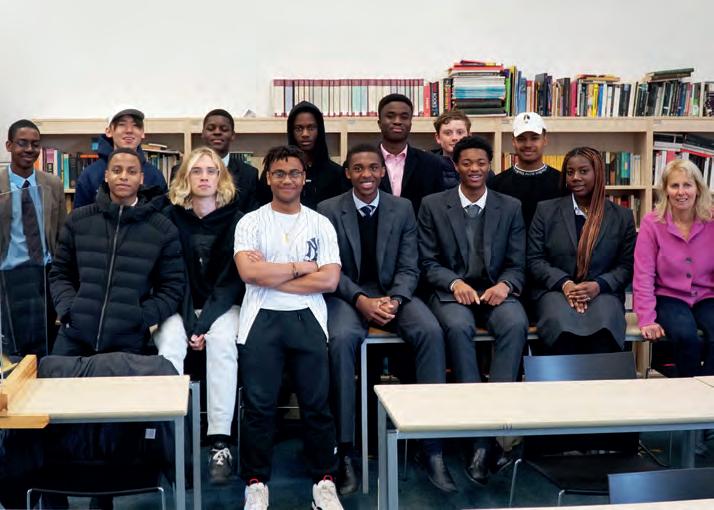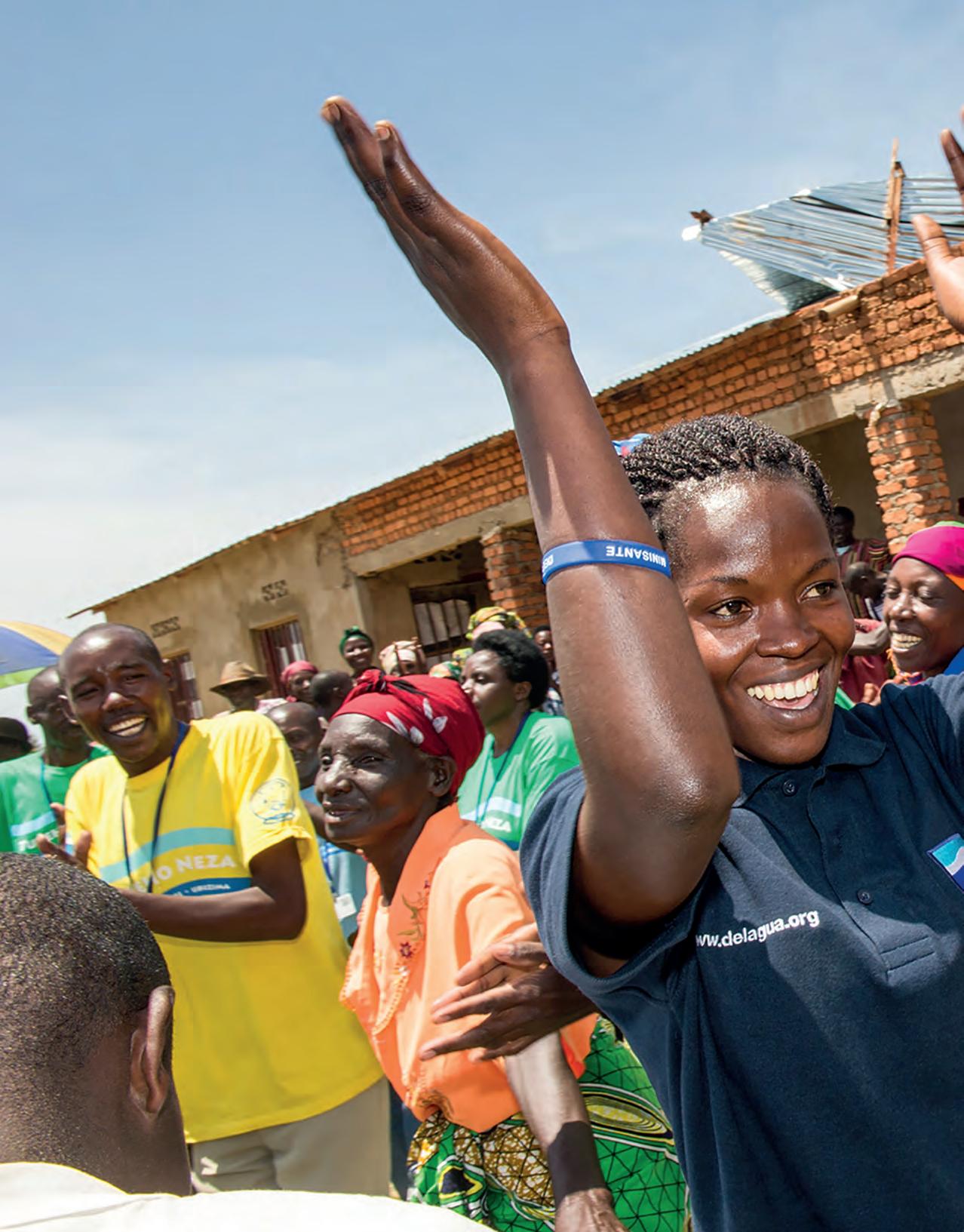
29 minute read
Societies & Events
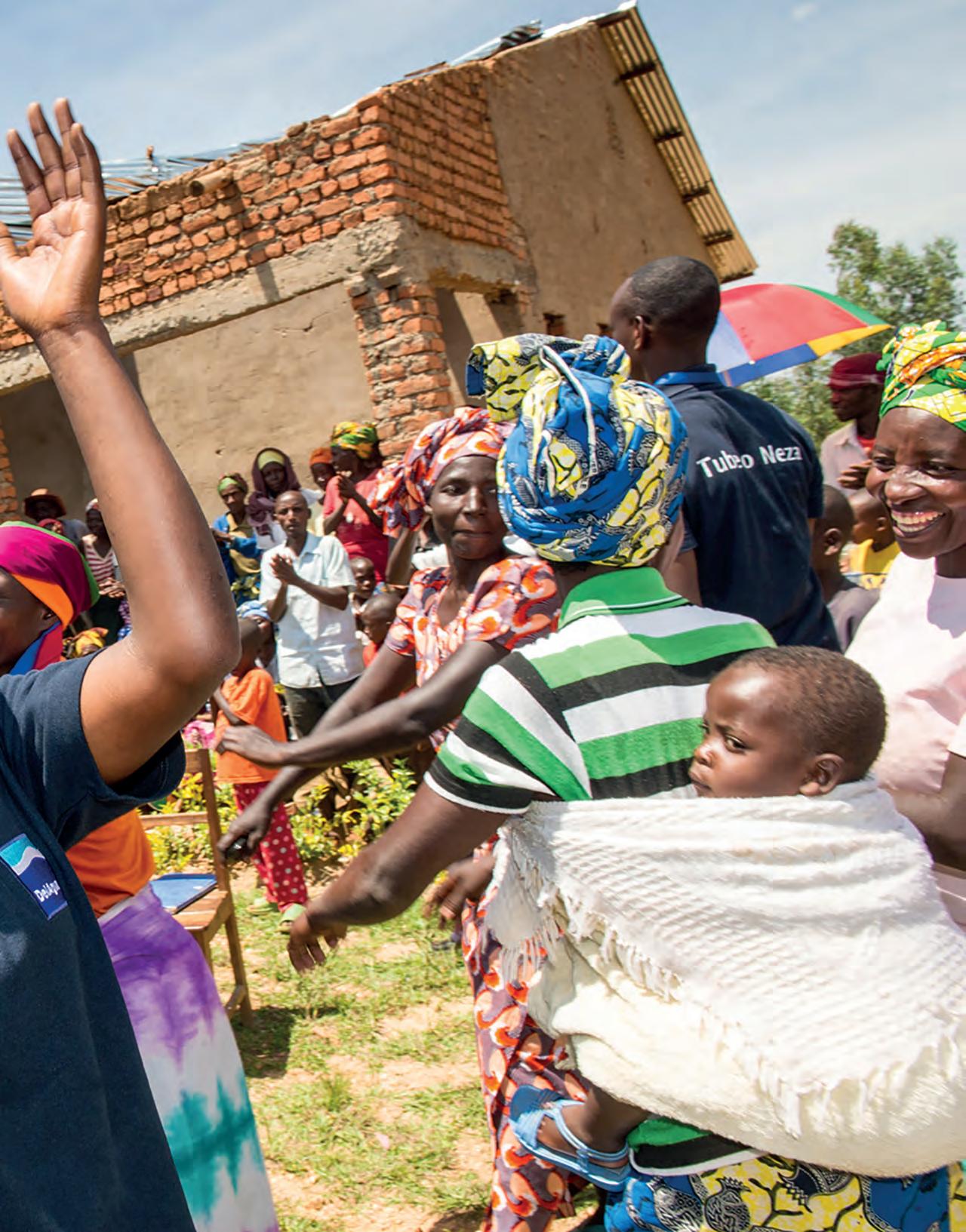
CLIMATE CHANGE CONFERENCE
Advertisement
This June, Charterhouse hosted its second annual climate conference to try and spread awareness of climate change and possible solutions to it. The event was attended by 400 people from 14 different schools. Here is a summary of all the talks from our presenters:

Pawel Kisielewski: Waste is only a resource in the wrong place
CCm Technologies Ltd is one of the Solar Impulse Foundation’s 1,000 solutions to climate change, due to its focus on better utilisation of food, agricultural, and water waste.
Its technology takes ammonia out of wastewater from industrial processes which normally would be left to contaminate water supplies. It is combined with C02 and additional nutrients to make fertiliser. This process is exothermic so the operator can use the heat produced.
CCm Technologies also produces anaerobic digestors, which produce biogas. This can be used for heat, electricity, and transport.
PepsiCo, owner of Walkers crisps, takes potato waste and turns it into fertiliser for its potato farms. This process uses 10% less nitrogen, reducing water contamination. By using C02 to produce the fertiliser, 1.75 million tonnes of C02 are removed from the atmosphere annually, the equivalent to taking 375,000 cars off the road. This talk really highlighted how we already possess the technology to change and how innovative solutions need not be too invasive to be beneficial to all.
Dr Jan Maskell: How does psychology relate to climate actions?
Dr Jan Maskell is a Psychologist and Environmentalist working with businesses and individuals to improve their environmental profile.
Dr Maskell first showed us climate change graphs – the ones we have all seen and know well – and then explained the idea of cognitive dissonance, when there is an inconsistency between our beliefs and actions, for example, the G7 leaders flying to the June 2021 climate summit in Cornwall.
There are many psychological barriers to sustainability: limited or selective knowledge, unhelpful social comparison, sunk cost fallacies, tokenism, and greenwashing.
Answering questions from the audience, Dr Maskell said she believes the airline and fashion industries must change the most, both in terms of production but also in the types of consumerism they encourage.
Francesca Fryer Rigden: Social entrepreneurship and community interest
Francesa Rigden founded Roots for the Future which works with local communities to plant trees. Roots for the Future is a social enterprise organisation, meaning that its mission is to tackle both social and environmental problems.
In her talk, Francesca highlighted the need for tree planting. Globally, 15 billion trees are cut down a year while only five million are planted.
Not only do trees function as carbon sinks, but studies have also shown that they prevent antisocial behaviour, allow children to learn better and ill patients to recover better.
The foundation works with local governments to reach communities that wouldn’t normally get the opportunity to plant trees and increase green space in their areas, whilst also aiming to increase social cohesion. Her talk highlighted how environmental action can have many social benefits too, and how the two goals can work together to increase living standards everywhere.
Euan McDougall (W13): Social enterprise – promoting environmental sustainability and empowering people
Euan McDougall is the regional director for East Africa of DelAgua which works with the Rwandan government to provide cooking kits to its population.
The company has benefited three million people through the provision of stoves. Previously, open fires were used which require lots of wood and present hazards to health and the environment. Using a stove rather than an open fire for five years results in a 10-tonne reduction in CO2 emissions, as 50% less wood is required to make it run, reducing both emissions and deforestation.
Upon completion of the project, when two million stoves have been provided, an area of trees the size of 8,000 football pitches will be saved per year alongside a drastic reduction in CO2. There is also a 73% reduction in household air pollution.
The project also has social benefits as it reduces the time taken to collect wood, enabling women to earn an income and children to spend longer at school. The message of this talk cemented how intertwined environmental and social progress can be and how small changes can have a lasting impact.
Arik Rosenblum: Israel and the sea
Arik Rosenblum is director of EcoOcean, a non-Governmental Organisation which operates in the sea around Israel. The organisation aims to protect the ecology of the 195km Israeli coast through fact-based research and collaboration with governments around the Mediterranean.
The organisation is part of EU Commission project ODYSSEA which aims to connect Mediterranean countries and collate their research into one database, thus facilitating protection and awareness of the marine environment. This is much needed: only 0.3% of sea is protected in contrast to 23% of land.
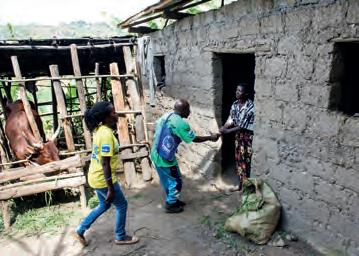
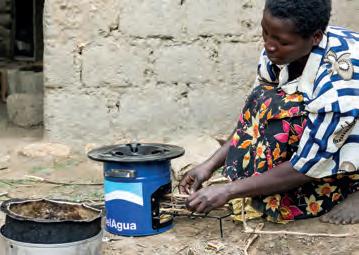
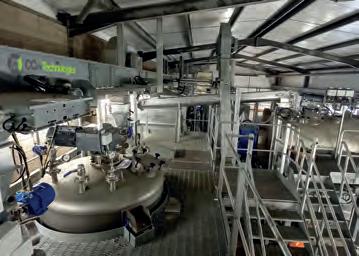
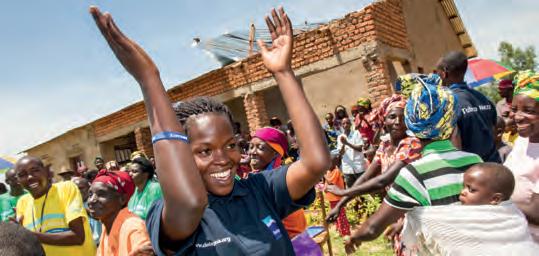
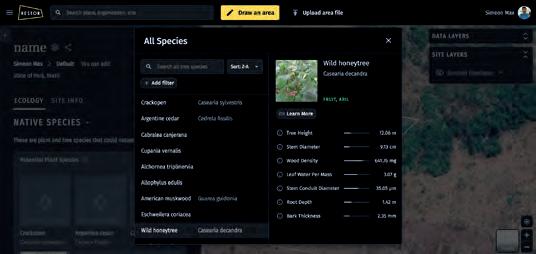
EcoOcean’s research boat, MEDEX, uses a robot, buoys, and gliders to map the seabed, collect data on habitats, and monitor microplastics. EcoOcean also takes action in emergencies. It trained and deployed 16,000 volunteers a day to clean up an oil spill off the Israeli coast in February. Education is another important strand of EcoOcean’s work, with video footage of their work shared globally and their organisation of the world’s largest beach clean.
This talks highlighted how an organisation of only 12 employees can have a huge impact on protecting the environment.
Dr Katherine Drayson: The importance of turning London’s transport green
Dr Katherine Drayson works in the Transport for London (TfL) strategy and planning team. Her role involves greening the ancient transport systems of London – work that has been particularly challenging in the last year as the pandemic has greatly decreased use of TfL and the fares on which it depends.
Congestion costs London £5 billion a year and causes a lot of pollution from idling vehicles. Ultra-Low Emission Zones (ULEZ) have been introduced to tax heavily polluting vehicles. Cycling and walking have been encouraged with new cycle paths and walking routes hoping that, by 2041, 80% of journeys will be taken by bike compared to the current 60%. TfL seeks to maintain its green spaces and promote biodiversity, encouraging wildflower growth by reducing mowing and taking away cuttings that otherwise stifle growth. This is important in a city which, despite gardens and parks making up 38% of its land and containing ancient woodland, is in the country with the poorest biodiversity of any G7 country.
Even in a global city, it is still possible to work towards a greener future and carbon neutrality by 2050, and the changes are starting now, with plans due to be published soon.
Dr Martin Evans: Restoring peatlands – returning ecosystem services and mitigating climate change
Dr Martin Evans is lecturer at the University of Manchester and his area of special interest is the peatland bog.
Peatlands are areas made of up of 95% decaying organic matter which is saturated with water. These areas preserve carbon due to the low oxygen conditions which slow the plant matter decay. Worldwide peatland areas account for 50% of soil carbon storage. In the UK these areas are under threat as less than 20% are undamaged and, as they degrade or are drained, release the carbon stored within them. A 5% loss in peat is equivalent to the annual UK greenhouse gas emissions. Martin’s team stop water draining from peatlands and establish vegetation on them which will become part of the peat and restore its carbon sink properties. Establishing vegetation is extremely important as, when peat is initially restored by increasing the water levels, C02 is sunk whereas methane gas is released, meaning that it takes ten years for the peat to become a greenhouse gas sink.
The team are investigating the effect of iron sulphate on vegetation growth which suppresses methane breakout. They are also examining the effect of burning the vegetation. Many peatland areas are managed for grouse and the vegetation is burnt to allow them to live. This process can be beneficial as burnt heather produces charcoal which then becomes part of the peat and thus sequesters carbon. However, if too much plant matter is burnt the positive effect is offset by the emissions produced from burning and thus the team is trying to uncover the ‘ideal fire’.
Peatland management is also important for reducing the effect of floods in lowland areas and thus is beneficial to all. Conserving and restoring little known habitats are extremely important in the fight against climate change.

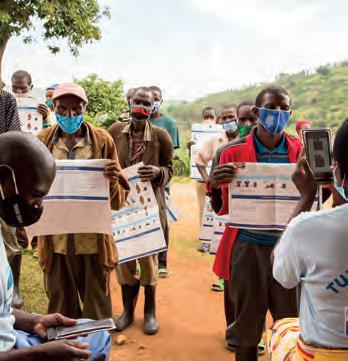
Tom Crowther: Reversing the effects of climate change via the ecosystem
Tom Crowther is the Chief Scientific advisor to the UN’s Trillion Tree Campaign.
Tom is responsible for Restor, which is an open-source platform onto which landowners provide data on the ecology of their land. This information is compared with satellite data from 20 years ago and demonstrates how vegetation has changed over time.
The overarching aim of the platform is to form a hub whereby users can be informed of vegetation native to their area and have support to increase biodiversity, while also possibly growing a sustainable business.
Benefits of Restor include creation of agribusinesses from edible plants; funding via carbon credits, as the platform measures carbon sequestration; increased customer base for landowners who demonstrate their environmental credentials; and protection of endangered flora.
ATOMIC – CHARTERHOUSE’S ‘NEXT BIG THING’
This is Atomic, Charterhouse’s brash, new, student-led scientific magazine – written, edited, and designed by Charterhouse students.
In creating this magazine, we aim to explore different topics within the Natural and Social Sciences as well as provide an opportunity to show off the talent and potential of Charterhouse’s brightest scientists.
Our aim is to create a platform for our contributors to write about scientific ideas and research, allowing them to step outside of their comfort zones. This also encourages them to learn more about their interests beyond the school syllabus as well as to exhibit and improve their writing skills, which is important in further education.
We publish our articles in a magazine intending to educate our readers, and we hope they learn something new and interesting in the carefully crafted articles.
Our process of writing the magazine is relatively straightforward: after gathering a group of writers and editors, we all come up with our topics and write them separately. Topics are grouped into sciences (Physics, Chemistry, Biology, Social Sciences, and mixed). As we want to maintain the quality of our writing, the references are attached at the back of the magazine. After some proofreading and quality checks, our graphics team adds images and transforms the essays into an attractive magazine for you to enjoy.
Currently, we are collaborating with Concord (UK) and West Island School (HK), and we expect to collaborate with more schools to expand Atomic next year. Collaboration projects are in the works and when they are confirmed, we cannot wait to share them with you. We share the same website with these schools (atomicmagazine.weebly.com) and it is a platform for all schools to publish their work as well as to access and view magazines written by different students. Additionally, our shared Instagram page, @atomic_mag, is also managed together with other schools. It is a page for us to share academic resources recommended by our beaks, celebrate science days, or simply teach basic concepts about different scientific topics. We hope you enjoy our next few issues!
Christopher Chan (L), Jiayi Gu (Su), Ningyi Zhou (F), Elyse Zhi Qing Wu (Su)
CHRISTIAN UNION
The Christian Union, like most societies, had to adapt this year to meet in year group bubbles. Three of these met regularly: a small group of 2YS studied Philippians and some Psalms together; a group of Fifths did a Bible overview and tackled lots of common questions about the Bible; and about twelve Fourths met each week to watch Christianity Explored talks online and then to discuss the questions raised. The highlight of the year was the annual BBQ at Artifex. Well over 100 pupils gathered to enjoy food together and to listen to a great talk from Nick Dagnall (former member of BH) about faith and sight. We look forward to the resumption of “normal” meetings in September; as always, anyone is welcome.
Mr Ed Reid
DUNGEONS & DRAGONS SOCIETY
It has been another magnificent year for our merry band of Dungeons & Dragons players this year. Not put off by the frustrations of Zoom, our campaign has continued to take us through a variety of different planes of existence and introduced us to easily out-wittable trolls, angry fomorians, and mysterious warlocks bearing the eggs of ancient dragons. We have been particularly fortunate to have Alex Hall (G) and John Deacon (R) as our Dungeon Masters this year, as well as a short campaign led by me. I look forward to debut campaigns run by Ciarán O’Lionaird (C) and Jeremy West (B) in the next academic year.
HISTORY SOCIETY
The past academic year has proven to be a seminal moment in the development of History Society, thanks to the members for their commitment to the society and to their fellow pupil speakers in those long winter months over Zoom. On our return to school in CQ, the popularity of the society has grown to the point that we have had to change venue. We are grateful to George Lake Coghlan (S), Yusuf Furniss (D) and Henry Anderson (L) for arranging the change in venue, as well as to CSgt Wilson and Major Eastham for allowing us the use of Armoury on a Wednesday afternoon.
Our pupils have, as ever, spoken on a fascinating range of topics from across the globe and a variety of different time periods. We have been lucky to hear well researched and engaging presentations from Caspar Stansfield (V), Ryder Hammond (V), Finn McCooke (B), Nero Jones (H), Viggo Terling (g), and Ritvik Mekala (B), covering everything from the Russo-Polish war through to the Israel-Palestine conflict. Next year, History Society is expected to go from strength to strength thanks to the enthusiasm and dedication of our pupils. Well done, everyone!
Mr Will Tink
INVESTMENT SOCIETY
Rebranded as the ‘Investors’ Club’, the society has had a very interesting and exciting first year, with its main purpose to serve as an academic platform suiting the interests of students interested in the financial markets and its ever-growing sectors. Our vision is to teach students about the benefits of investing early and actively, while educating them about the responsibility and risk involved. While the coronavirus pandemic has posed various challenges with inviting speakers and planning events, the society has still enjoyed a regular 40 members via Zoom. This year, we covered a range of topics ranging from the fundamentals of investing to the financial crisis in 2008 to cryptocurrencies. Fortunately, we were able to invite and interact with high profile investors and financial institutions. Our lineup of speakers included Samridh Seth (F18), a 20-year-old OC, Mr Grossegger from Pictet Group, Mr Cyrus Kapadia of Lazard, and Dr Tatiana Boroditskaya of UBS Wealth Management. These speakers were able to share the experiences and knowledge they had gained from working in the finance world. They illuminated topics such as emerging markets and their role, investment banking as a career, and portfolio management. In addition to the lectures, the society undertook the Charterhouse Investment Challenge, where students were given $100,000 to develop a portfolio with the knowledge they have gained. At the end of the summer, we will declare a winner who will win a cash prize of fifty pounds. We have had an eventful year with massive cooperation from our members and speakers and we look forward to seeing them back in OQ.
Mr Stephen Barnett
LAW SOCIETY ARTICLE
Throughout the past academic year, the Law Society has been known for attracting multiple high-profile speakers, hosting talks from Michael Mansfield QC to Lord Heseltine and even Nigel Farage in what has been a packed schedule. Though the Charterhouse Law Society by name, we have welcomed a large number of political speakers, underscoring the significant links between law and politics. In particular, Nigel Farage talked about ‘the role of lawyers in the recent US Election’ in which he lost £10,000 by betting on Donald Trump winning! Farage heavily criticised President Biden in his talk, labelling him weak and unfit for the job, whilst adoring Trump, calling him a larger-than-life character and defending him at every angle. Whilst pupils were keen to ask Mr Farage some challenging questions, the responses were very
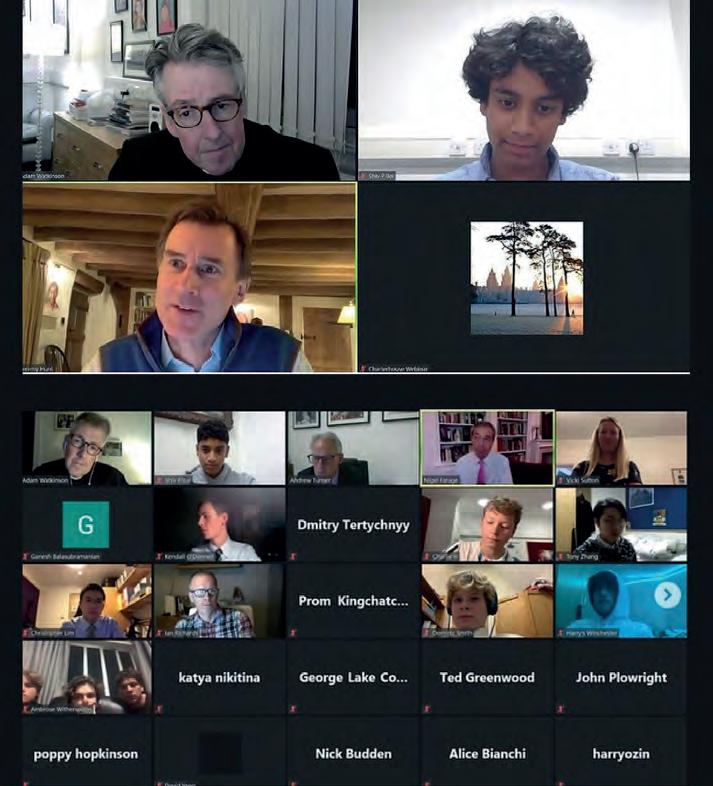
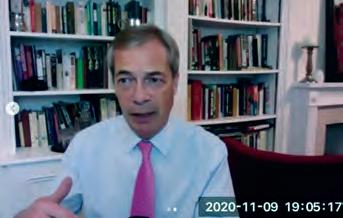
much pro-Trump. Yet, Mr Farage was willing to admit that there is a real lack of evidence to suggest that President Biden was elected illegally.
This year, we have enjoyed hearing from a range of speakers with different political stances, and this is demonstrated by the talk from Lord Falconer QC, Shadow Attorney General and the inaugural Justice Secretary under Tony Blair, who provided an ideological counterbalance to Farage. He reflected both on the 1997 Labour landslide and the future of the Party, telling us why he believes Sir Keir Starmer is the right leader to unify Labour. Lord Falconer was also questioned about his somewhat controversial pro-euthanasia stance, about which he spoke passionately. Our range of speakers was complemented by the diverse audiences for these talks, containing not only Carthusians, but also a great number of students from local comprehensive schools in the Surrey area as well as from the Guildford University of Law.
Inevitably, Brexit and Covid-19 were at the forefront of many of the talks. The first talk of the year was given by former Leader of the Green Party, Baroness Bennett, who discussed Brexit and, of course, her own political career, as well as today’s tumultuous political landscape. Those attending the Law Society this year were able to gain a well-informed understanding of this landscape, since we were exceedingly fortunate to hear from so many active members of British politics, including notable OC, Jeremy Hunt (W84), former Foreign and Health Secretary (and, perhaps more significantly, former Head of School!), who was questioned on Dominic Cummings and the 2019 Conservative Leadership Election. Mr Hunt praised Rishi Sunak heavily for his involvement in the UK Government’s Covid-19 response, labelling him as a future Tory leader. Indeed, it was pleasing to welcome back two Old Carthusians to speak for Law Society this year – not only Jeremy Hunt, but also Lord Briggs QC (B72), Justice of the UK Supreme Court, who talked about the role of the Supreme Court in today’s society as well as their work on a day-to-day basis and how the Justices make decisions.
World renowned barrister Michael Mansfield QC labelled his talk ‘A Brief Encounter’, and discussed how the law has changed since he first started practising, highlighting the constraints the pandemic has put on the legal system, especially in courts. Mr Mansfield suggested that the chance of seeing a jury again in person might be very small, also making some particularly powerful predictions for the future such as, ‘the way we live, the way we work, and the way we relate all are going to be governed by how we respect nature; and at the root of this is rebellion’. We were able, however, to gain an insight, not only into the future, but also into the past of British politics with a talk from Lord Heseltine, former Deputy Prime Minister, who talked about his career in politics. Interestingly, when questioned about the occasion when he lost the Conservative whip, Heseltine became very defensive, saying that he was still a Conservative having recently donated money to the Party.
Finally, I would like to thank all our speakers for collectively providing us with an extremely well-rounded picture of British politics in the past, present, and future! I would also like to thank Mr Turner and Mr Tink for their help this year with the Law Society, as well as, of course, Father Adam. A legend in his own time, Father Adam will be greatly missed, and I’d like to thank him for creating the Law Society with me and I wish him all the best at Repton.
Shiv Pillai (G)
NETWORK SUMMIT
Over the first five days of March, I had the pleasure of leading the effort to organise and host the Network Summit with the help of other dedicated members of the Academic Committee. Over the course of the summit, we heard from leading academics in their fields at some of the best universities in the UK, speaking to pupils on topics as diverse as Law at University, ‘Visual Representation in Film,’ and ‘Multicultural Iberia.’
Firstly, my thanks go out to Olesia Vasileva (C) and Kendall O’Donnell (L), who were both pupil hosts for a few of those lectures and senior members of the Academic Committee who helped us liaise with the speakers.
The purpose of the five-day Network Summit was to broaden pupils’ horizons, providing them with the opportunity to better understand the sheer diversity of university courses and career options in front of them. From pursuing a career as a musician at a world-leading orchestra, to working in Square Mile law firms, the Network Summit lectures were able to break down the options available to pupils. Pupils got the opportunity to learn what it takes to study these courses and apply for these jobs, and they got to see the variety of higher education facilities available at the speakers’ universities, from Chemistry labs to recording rooms.
In addition to learning about the careers opportunities these lectures presented, attendees also gained insight into the speakers’ research. From the political narratives behind the portrayals of people in documentaries to translating the poetry of Catullus, viewers got to see what it’s like to be an undergraduate student at some of the UK’s leading universities. From in-depth analysis of texts to discussions on turning points in British interwar history, pupils were able to pick up the skills needed to conduct university-level research and discussion, while remaining interested in these stimulating discussions.
Overall, given the feedback we received from beaks, pupils, parents, and other members of the Charterhouse community, I think we can say that it was
a success. The amount of interest shown by pupils and parents in the sheer variety of options on offer and opportunities available was staggering. This year, we broadened our horizons, and we were more learned because of it.
https://charterhouse.fireflycloud.net/ student-council/committee-pages/ academic-committee/network/2021photographs
Christopher Lim (R)
PERCEPTION – INSIGHTS
At the heart of Perception lies human behaviour and the human condition. Perception holds the stage as one of the most high-profile academic societies at Charterhouse and in this exceptional year, I have sought to explore themes related to psychology, neuroscience, medicine, cognitive behaviour, physiology, biotechnology, and much more.
In his lecture ‘Battles between minds’, Lt Col Alasdair Truett MBE spoke about his experiences in the Parachute Regiment and painted a vivid picture of what it is like to face extreme danger, the importance of controlling human instinct, and the strategies he employed to deal effectively with stress.
Alasdair’s perspectives and stories, many relating to the operations in Afghanistan, were both thought provoking and chilling as he stressed the importance of building psychological resilience in people, particularly in the face of adversity. He emphasised the value of effective communication, approaching tasks with discipline and focus. Towards the end of his lecture, he got pupils thinking about developing their own skills and how they could apply them when facing personal challenges to achieve successful outcomes.
From war zones and areas troubled with conflict, Perception shifted its focus to humanitarian work and presented Carthusians with the inner workings of the Nott Foundation, an organisation founded by Dr David Nott, a leading figure in medicine and the first surgeon to combine laparoscopic and vascular surgery. He is also author of the incredibly moving book, The War Doctor.
The main purpose of the organisation is to equip surgeons operating in unstable regions of the world with the skills, knowhow, and technical expertise to offer support to those most in need. We were joined by Head of Donor Relations, Mrs Rebecca McLoughlin, who shared with the audience real-life case studies, including a young female doctor in Libya who was able to save lives thanks to the training offered by the Foundation.
Forensic psychologist Dr Rebecca Milne from the Institute of Criminal Justice Studies has worked closely with police and criminal justice organisations both within the UK and abroad and we were delighted that she was able to lend our pupils her insights for Perception. As a member of the ACPO Investigative Interviewing Strategic Steering Group, Rebecca introduced the concept of ‘the cognitive interview’, a technique that she has developed to help train police officers to interview suspects or witnesses to a crime effectively.
She explained how the approach was underpinned by human psychology and identified key pillars including ‘context reinstatement’ to create a vivid image of the scene, ‘reversed temporal order of recall’ to disrupt memory scripts from playing out, and ‘changed perspectives’ as a mechanism to get people to think out of the box and to trigger memory.
Pupils were mesmerised when Rebecca presented real-life examples and the strategies that she would use to improve and enhance the quality of information retrieved. Pupils also learnt about how the process of memory consolidation and recall works and how they could use this knowledge to improve their own cognitive function. The lecture was a powerful example of psychology in application.
Whilst ostensibly straightforward, the ability to read is a complex skill that is acquired, refined, and developed through many years of continuous, guided practice. Knowing her background and research interests, I specifically invited Prof Kate Nation, Fellow of St John’s College, Oxford, to dispel some myths around this very ‘human’ skill and the challenges associated with reading.
She spoke about the alphabetic principle, addressed how children decode words and derive meaning, and highlighted the complexities of comprehension and our growing knowledge base which is crucial to mastering fluency. In addition to the evolutionary need for a writing system to code for the complex sound signals of speech, Prof. Nation also discussed the
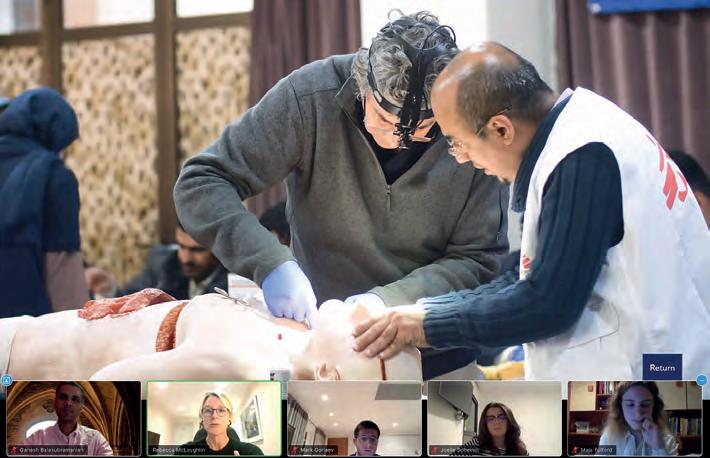
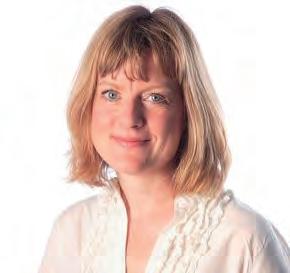
Prof Kate Nation, Director of ReadOxford & Language and Cognitive Development Research Group
methodologies for measuring and understanding comprehension. She left our pupils contemplating deeply about the very skill that they have taken for granted for many years.
Every lecture had a powerful and lasting impact on our pupils. Mr Davies’s lecture on ‘Beeswax & Ropes’ explored human behaviour within a financial decisionmaking concept. Mr Hope chronicled his experiences of setting up and managing the only neurosurgery unit in Nepal and the issues of providing medical care within an impoverished country, despite the limited facilities and funding. These lectures illustrate the mechanisms by which topics are approached in a holistic and cross-disciplinary manner, something so unique to Perception.
We were very lucky to have been joined by Mr Levine, President of Foundation Ipsen, is an internationally renowned expert in obesity, a named expert at the United Nations, and a consultant to governments across the globe. His lecture, ‘NEAT – The Energy of Life’, focused on the effect of sedentary lifestyles on our body at the molecular level and even explored the impact of office design. He says: ‘people often associate health problems such as heart disease and obesity with eating too much, but not sitting too much’ and that ‘sitting is bad for lean people too – sitting in your chair after a meal leads to high blood sugar spikes, while getting up after you eat can cut those spikes in half’. Throughout the lecture, pupils were able to develop a deeper understanding of the challenges associated with rising
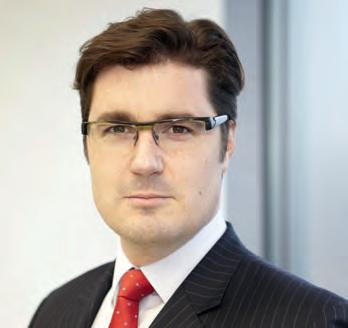
Mr Greg Davies, Head of Behavioural Finance, Oxford Risk
obesity and cardiovascular disease, but also appreciate the approaches that could be taken on a daily basis to mitigate their risk.
The Perception lecture series culminated with an exploration into ‘The Beauty of Silks’ by Cambridge scientist Dr Darshil Shah whose research into sustainable materials and product design at the Centre for Natural Materials Innovation led him to explore the unique properties of silk, leading to the discovery of future materials that can help solve plastic pollution.
Covid-19 brought with it unprecedented disruption but, despite this, pupils have enjoyed an extraordinary year of outstanding Perception lectures and the programme occupies a very special part of life at Charterhouse, inspiring our pupils with the wonders beyond.
Dr. Ganesh Balasubramanian
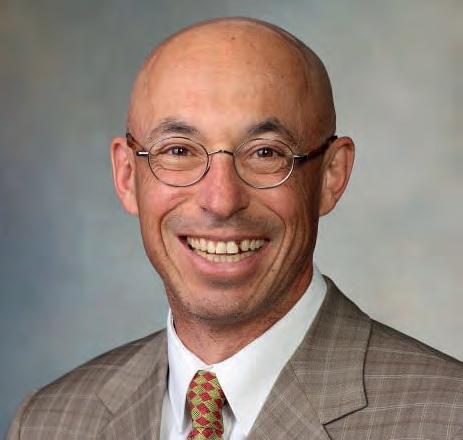
POLUNIN SOCIETY
It has been another exciting, yet academically rigorous Quarter for Polunin Society, the society for select Specialist biologists. Led by Mr Bagley, the society discusses a wide range of biologically relevant topics, drawing connections between seemingly distant parts of the global ecosystem – from 1,000-acre mycorrhizal networks to Mr Bagley’s own phylogenetic connection with a mushroom. Members are always encouraged to think outside the cell membrane and to contribute ideas – no matter how outrageous they might sound. After all, life on earth itself is controlled by small colliding spheres of sugar and protein.
We studied many exciting topics, ranging from the respiratory system to applying ecology to cancer. Members of this society also went far beyond the curriculum’s boundaries, delving into questions such as seal mating strategies, considerations of a link between mutations and cancer, and the introduction of a top predator leading to an increase in biodiversity. We also celebrated International Women’s Day in Science by dedicating one of our sessions to discussing amazing discoveries made by women, mentioning Rosalind Franklin, Alice Roberts, and many others. One of the most memorable moments was the opportunity to work in a team with each other and face the challenges of the Olympiad.
Members of the Polunin Society were invited to take part in the British Biology Olympiad. This is a competition for students in which they have the opportunity to demonstrate their proficiency in Biology and possibly receive a commendation. The competition involved two papers; they were both multiple choice papers that questioned us on a number of biological topics of which we had never previously heard. During Charterhouse@Home, we practised the skills required to succeed in this competition; we were all given several past paper questions and discussed how we came to our answers in breakout rooms. Overall, the practise we acquired in the Polunin Society improved our ability to answer these questions and optimised our performance in the Olympiad.
Finally, we would like to thank Mr Bagley, whose unrelenting efforts have come to fruition in yet another term of fascinating society meetings which, without a doubt, every single one of us enjoyed. We truly appreciate the opportunities Mr Bagley has presented us with, and we hope to be able to take full advantage of them in the months to come.
Mark Gorman (B), Olivia Pryer (F), Olesia Vasileva (C), and Zhen Yang Lin (W)
UNITY SOCIETY
Following the tumultuous events in the summer of 2020, including the tragic passing of George Floyd and the subsequent riots, a group of pupils came together to form a group called ‘Unity’. The aim was to create a safe space where individuals can feel comfortable discussing issues of racism and discrimination, particularly if they feel marginalized on account of their background. It was also an opportunity to socialise with likeminded people, ultimately leading to proactive discussions regarding how we can improve the School. We met every Friday during OQ over Zoom – hopefully it will be in-person next year!
In September and October 2020, during OQ, the pupil Heads of the society spoke to all the year groups in Chapel on the topic of equality, discrimination, and our general experiences inside and outside of School. Through these speeches, we hoped to help spread the message that hate is never the answer and we, as a School, are much stronger if we are considerate and kind to each other. It was an obvious message, but it was very well received and further raised awareness about the society throughout the School.
Our first invited speaker was Ayo Gabriel on 25th November 2020, who works at the prestigious firm Goldman Sachs. His role as Executive Director in Private Wealth Management allowed him not only to provide an insight into the mechanics of banking, but also to articulate his experiences of the industry as a black man of Nigerian descent. He acknowledged that there was a similar reckoning in the corporate world after the summer’s events and is pleased to note that improvements have been made. Although, he also stated that there is further room for progress. This talk was very valuable to anyone interested in finance, regardless of race, as well as being an excellent insight into the corporate world.
For Black History Month, in addition to the aforementioned speeches in Chapel regarding equality and discrimination, the School helped to raise approximately £1500 for ‘Show Racism the Red Card’. This is a charity established in 1996 and dedicated to educating individuals about racism through workshops, training sessions, and multimedia packages. We had a mufti day to raise money where everyone wore red, and it was pleasing to see how many participated.
The highlight of this year was the talk given on the 23rd April 2021 by Stuart Lawrence, the younger brother of Stephen Lawrence. Stephen Lawrence was, as many of you know, killed on the evening of 22nd April 1993 in a racially motivated attack. The case gained international traction at the time and sparked an important conversation concerning systemic racism. Stuart, a teacher and motivational speaker, spoke about his own personal experiences surrounding the death of his brother and how it has affected him and his family throughout the years, and he left us with the poignant message about the power of our voices, and how each of us can make a change. We would like to take this opportunity once again to thank Stuart for taking time out of his busy schedule and for articulating his message so brilliantly. Please also be sure to read his new book, Silence Is Not An Option, which is also available in the School Library.
Overall, in a year hampered by the pandemic, Unity Society has been one of the highlights and we are pleased to have contributed in this way. It goes without question that we owe a massive thanks to the School for supporting us. A special thanks goes to Ms Jan Symes and Mr Rotimi Akinsete, who were all crucial in helping organize the society and outside speakers, and to Mrs Louise Wilson, whose initiatives such as the EDI (Equality, Diversity, and Inclusion) steering group was and will continue to be a huge device for challenging stereotypes and implementing lasting change.
Lastly, Unity Society would like to thank every single person who spoke up against injustice and discrimination and decided that silence was not an option. You are the real difference makers!
Demi Adedoyin-Adeyinka (V)
